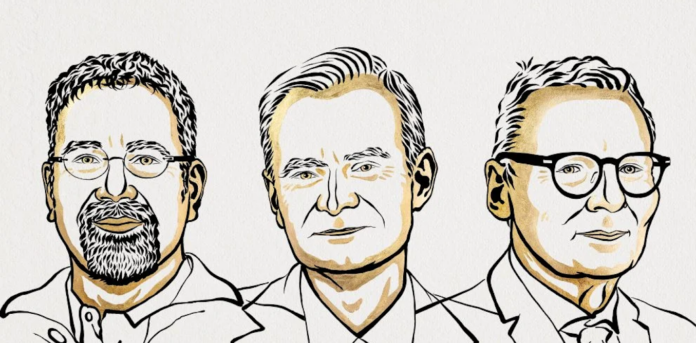On October 14, the Nobel Prize in Economics, awarded by the Bank of Sweden, was awarded to Daron Acemoglu, Simon Johnson and James A. Robinsonfor “their work on how institutions form and affect prosperity.” Their contributions, both theoretical and empirical, allow us to understand why certain nations are experiencing great economic difficulties today, given the history of colonization.
In 2022, according to the World Bank, Denmark’s per capita income is $74,000 (reduced to purchasing power) while that of Sierra Leone stands at $1,900. How can we explain such differences in income between nations? How can we also explain that even when the poorest countries tend to get richer, they do not catch up with the most prosperous? It is on these questions that the work of this year’s winners of the Nobel Prize in Economics (more precisely the Bank of Sweden Prize in Economic Sciences in Memory of Alfred Nobel) focuses, Daron Acemoglu, Simon Johnson and James A Robinson. Their contributions highlight empirically and theoretically that an important explanation of these issues is linked to the central relationship between institutions (property rights, legal system, political systems, public governance) and prosperity.
The role of colonization, a key factor
One of the main contributions of the laureates was to consider the historical experience of colonization, and more precisely the nature of the political and economic systems that European colonizers introduced, or chose to maintain, from the 16the century in the colonized world. They observe that this type of institutions depends on the number of European settlers established in the colony.
When the environment was more hostile, either due to a denser indigenous population resistant to the invader, or due to the prevalence of deadly and dangerous diseases, the colonizers were in fact fewer in number. They then set up extractive institutions to exploit the masses for the benefit of a local elite, establishing extremely limited political rights. This has been detrimental to long-term growth.
In contrast, colonies with many colonizers – so-called settler colonies – developed inclusive economic institutions that provided incentives for settlers to work and invest in their new homeland. This in turn led to demands for political rights that gave them a share of the profits. These institutions establishing basic economic freedoms and the rule of law have been beneficial to economic development.
Using, among other things, the mortality figures of the colonizers, the Nobel Prize winners have thus highlighted the following statistical fact corroborating this argument: the higher the mortality among the colonizers, the lower the income per person today. inhabitant, and the greater the poverty, corruption and lack of rule of law.
How to change systems when interests differ
Nobel laureates also developed an innovative theoretical framework that explains why some societies find themselves trapped in extractive institutions, and how it is sometimes possible to break free from legacy institutions to establish democracy and Rule of law.
The winners’ explanation focuses on conflicts over political power and the problem of credibility between the ruling elite and the population. As long as the political system benefits elites, people will not be able to believe that the promises of a reformed economic system will be kept. Conversely, a new political system, giving the population the opportunity to replace leaders who do not keep their promises, would make it possible to reform the economic system.
However, the ruling elites do not believe that the population will compensate them for the loss of economic benefits once the new system is in place. This so-called “commitment” problem is difficult to overcome, and it explains why some nations remain trapped in extractive institutional structures, with mass poverty and great inequality between ruling elites and other members of society.
Democracy for lack of trust?
Interestingly, this same inability to make credible promises may also explain why transitions to democracy sometimes occur. Indeed, even if the population of a non-democratic nation lacks formal political power, it has a weapon feared by the ruling elites: its numbers. A mobilization of the masses can in fact materialize into a revolutionary threat for the elites.
These elites are then faced with the following dilemma: they would prefer to stay in power and simply try to appease the masses by promising economic reforms. But such a promise is not credible because the masses know that the elites can quickly return to the old system once the situation calms down. In this case, the only option for the elite might then be to cede power and introduce democracy. This would allow the implementation of economic policies more favorable to growth and redistribution to the masses, while avoiding the more costly consequences of violence and revolution.

